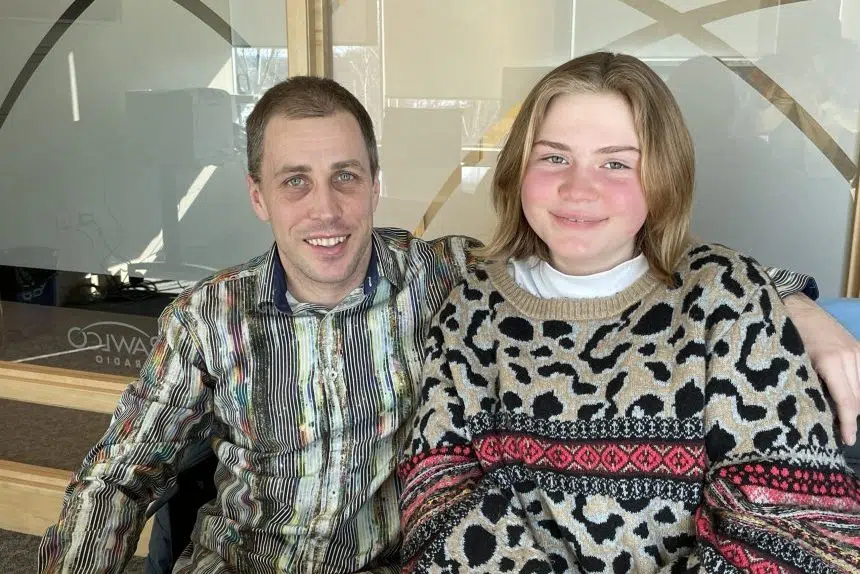In the opinion of Oleg Kougiya, the war between Ukraine and Russia does not have a place in this world.
“I lived in (the) Soviet Union and I lived in Russia long enough not to get shocked with a lot of things because I know, unfortunately, a lot of things … that you cannot even imagine about what can happen in that territory,” Kougiya said.
Even so, he said the escalation to war against Ukraine by Russia was a shock to him.
The Russian immigrated to Saskatchewan years ago, knowing it offered him and his future family greater opportunities. His kids, Kougiya shared, are “100 per cent Saskatchewan-made.”
Kougiya said he is absolutely against violence and fighting, particularly as a means to solve conflict. By no means, he said, should a country invade another independent country and “try to set up there.”
“Under no way should violence be used as a tool to resolve any kind of political or any kind of issues that might originate between two countries,” Kougiya said.
“The explanation that ‘We will have to kill more people to stop the violence’ does not make any sense.”
He and his daughter, Julia, are part of the Kalinka dance group. Their group speaks Russian but is composed of people from various cultures, including many from Ukraine.
“I know the kids are devastated with what’s going on right now and they don’t understand why it’s happening,” Kougiya said. “They don’t understand why they look at each other differently now.”
Kougiya said neighbours who live beside each other for thousands of years are going to have pages of history between them, both good and bad. He totally supports Ukraine and its desire to keep its independence and fight for its freedom.
“But by no means am I saying I’m supporting the war, any of the sides,” Kougiya noted.
“Everyone is affected”
Kougiya said he still has friends in Russia, and some of his wife’s family is still in the country too. Thankfully, none of them are near the war zone.
But even being from the country on the other side of the conflict, Kougiya said “everyone is affected.”
Julia’s best friend is Ukrainian, and her grandparents still live in Ukraine — right in the midst of the conflict.
“She’s very very worried and I feel really really bad,” Julia said of her friend. “It’s scary.”
Julia, 13, has grown up dancing with the Kalinka group, practising and performing Ukrainian, Russian and gypsy dances. She loves it and said it helps her feel close to her culture.
“I really like the group because there’s a bunch of different people. Most of my friends are in it,” she said.
“I still like to dance with those people … I don’t think the war is necessary. I don’t think it’s necessary to change my views.”
She shared that to her, it doesn’t matter where people are from.
Likewise, her father said people who have come to Canada from that area of the world are all Canadian now.
“We all came to Canada for a better life and we remember our background and we consider each other friends,” Kougiya said, adding they don’t consider who in the group is from Russia as opposed to Ukraine.
“Nobody should fight and neighbours should do it even less.”
Consequences of cultural conflict
Kougiya said economic consequences will be another result of the war, hurting people in both countries.
While both Ukraine and Russia have economic struggles, Kougiya said the Russian government “is not scared to put people in extreme poverty.”
He said the Russian Federation has numerous resources — oil, gas, lumber, coal — and people are considered replaceable.
The consequences facing people mean the protests being reported in Russia now are not as big as the media has made them seem, Kougiya said. That’s because the consequences of speaking out against the Russian government are significant. A 15-day jail sentence for someone with a full-time job and family to care for isn’t worth it for many people.
“Which is understandable, because when you don’t have freedom of speech and you get somehow punished for expressing your opinion against the war, it’s going to hurt a lot of people,” Kougiya explained.
He feels like he is in a “difficult situation” now, and feels an urge to “have to do something,” though he is unsure of what exactly he should do. He imagines many people in similar positions to him feel the same way.
“To me it’s absolutely … wrong that the Russian government tried to impose their made rules over the territory of a different state,” Kougiya emphasized.
“It’s not a democratic way of solving problems … but no one says the Russian government is democratic,” he said with a wry chuckle. “But that’s the topic of a different conversation.”











